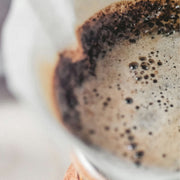The Truth About Decaf Coffee: How It’s Made and Why It’s Loved

It’s 9 PM, and you’re craving a rich cup of coffee. But it’s late, and sleep is calling soon. Or its 4pm on a cold day and you've already had 2 coffees in the morning. Enter decaf coffee: your perfect coffee companion. Decaf coffee is more than just a caffeine-free alternative—it’s a way for coffee lovers to enjoy their favorite brew at all hours without worrying about the buzz. But how is decaf coffee made? What should you look for in a good decaf coffee? And are there any common concerns about its safety? What about its flavor profiles?
In this blog post, we want to share everything you need to know about decaf coffee, from how it’s made to why decaf drinkers might just be the most enthusiastic coffee lovers of all.
What is Decaf Coffee?
Decaf coffee is coffee that has had most of its caffeine removed. Contrary to popular belief, decaf isn’t 100% caffeine-free. It typically contains about 2-3% of the caffeine found in regular coffee. For example, a standard cup of regular coffee contains about 95 mg of caffeine, while a cup of decaf will have only 2 to 5 mg. That’s enough to give you the coffee taste without the jitters.
Does decaf coffee have caffeine?
Yes, but in very small amounts. The FDA allows coffee labeled as decaf to have up to 3% of its original caffeine content. This is great news for those who love coffee’s rich flavor but may need to cut back on their caffeine intake.

The important question: How is Decaf Coffee Made? The Process Explained
There are several methods for decaffeinating coffee, but the goal is always the same: remove the caffeine while preserving the flavor. The process begins before roasting, with green (unroasted) coffee beans. Below are the most common methods used to decaffeinate coffee, but we’ll focus on one method that stands out: the Mountain Water Process.
- Mountain Water Process: This is a completely natural, chemical-free method that uses pure water from the mountains to gently extract the caffeine from the beans. The water is rich with soluble coffee components, so as the caffeine is removed, the flavors stay intact. It’s one of the best options for preserving the full-bodied taste of the beans, making it an excellent choice for decaf coffee lovers.
- Swiss Water Process: Similar to the Mountain Water Process, this method also uses water to remove caffeine without chemicals. It’s highly effective, removing 99.9% of the caffeine while retaining the coffee’s flavor.
- CO2 Process: In this method, carbon dioxide is used to extract caffeine. It’s efficient and free from harmful chemicals, although less common and potentially more expensive than water-based methods.
- Direct Solvent Process: This method uses chemicals like ethyl acetate or methylene chloride to remove caffeine. While deemed safe in some countries and not in others, some coffee lovers prefer avoiding these chemicals altogether. There has even been some recent debate in the United States of banning certain types of decaf coffee that are treated this way.
What should you look for in a decaf coffee?
Look for coffee made using the Mountain Water Process or Swiss Water Process, as these methods are chemical-free and better at preserving the natural flavors of the beans. If the decaf coffee you are buying does not indicate the process, it may be questionable that you're getting value for your purchase. True specialty coffee enthusiasts always respect the origin, and all the processes it went through to get to your cup. If you're not sure of the process, just ask your roaster. If you’re health-conscious or simply want a more natural process, these two methods should be your go-to.
Popular Decaf Coffee Regions and Flavor Notes:
- Latin America (Mexico, Colombia): These regions are known for decaf coffees with rich, nutty flavors, often combined with chocolatey or caramel notes.
- Ethiopia: Ethiopian decaf coffee tends to be more complex, with fruity and floral notes that make for an aromatic and flavorful cup.
- Brazil: Brazilian decaf is smooth and low-acid, often with subtle hints of chocolate, nuts, and spice.
Each of these regions produces decaf beans that maintain their unique flavor profiles, despite the removal of caffeine and can be truly enjoyable.
If you're curious about decaf, be sure to try our organic, mountain-water processed from Ethiopia that has beautiful flavors of cocao, raisin, and a complex floral aroma.
Is Decaf Coffee Safe to Drink?
The short answer is yes. Decaf coffee is completely safe to drink. Many people worry about the chemicals used in some decaffeination processes, but these concerns are largely unfounded. The FDA has approved the solvents used in decaffeination, such as ethyl acetate and methylene chloride, and the trace amounts that remain in the coffee are far below harmful levels. It comes down to how much you trust your coffee provider and their knowledge about sourcing coffee beans ethically, sustainably, and informing you of that information.
Is decaf coffee healthy?
Decaf coffee still contains most of the antioxidants and nutrients found in regular coffee, such as magnesium and potassium, which can be beneficial for your health. Additionally, if you’re sensitive to caffeine or have conditions like anxiety or high blood pressure, decaf coffee is a safer choice that allows you to enjoy the taste of coffee without the caffeine-related side effects.
Why Some Coffee Drinkers Prefer Decaf
Decaf coffee is often the go-to for people who love coffee’s taste but don’t want the stimulating effects of caffeine. Whether it’s due to health reasons, sensitivity to caffeine, or simply wanting to enjoy a late-night or afternoon cup, decaf drinkers are often some of the most devoted coffee lovers. After all, it’s not about the caffeine buzz; it’s about the flavor, the ritual, and the joy of sipping a perfectly brewed cup—anytime, day or night. For us, we often find drinking full cups of coffee after 3pm (or often late night cuppings) tend to keep us up a bit longer at night. This is the life of a coffee professional, so we are used to it. But for regular coffee drinkers, decaf might open a whole new world of coffee beans and flavor profiles.
Why do people drink decaf coffee?
Many people turn to decaf for its versatility. You can drink it in the morning, afternoon, or late at night without worrying about it keeping you up. It’s a great option for those who love coffee’s rich taste but want to avoid caffeine for health or personal reasons.

Common Concerns About Decaf Coffee
There are several misconceptions about decaf coffee that persist, despite the advancements in the decaffeination process. One of the biggest concerns is that decaf doesn’t taste as good as regular coffee. While this may have been true in the past, modern decaf methods, like the Mountain Water Process, have significantly improved flavor retention. High-quality decaf coffee is often nearly indistinguishable from its caffeinated counterpart. If you notice certain abnormal tastes in your decaf, it may be other factors such as defects in the beans themselves, how they were roasted, or even brewing techniques. Its important to eliminate all variable factors to make certain that the issue is identified.
Does decaf coffee taste different?
Yes, but only slightly. The removal of caffeine can cause a small shift in the flavor, but high-quality decaf, especially from regions like Colombia or Ethiopia, still delivers rich and nuanced flavor profiles. Taste tests have shown that most coffee drinkers can’t tell the difference between decaf and regular coffee when it’s brewed well.
The Enthusiastic World of Decaf Drinkers
Decaf drinkers are some of the most enthusiastic coffee lovers around. Why? Because they’re in it for the flavor and the experience, not the caffeine. They appreciate the craftsmanship behind a good brew, and the ability to enjoy it without the side effects. Many coffee shops are now offering high-end decaf options, further proving that decaf drinkers are a respected part of the coffee community.
Decaf isn’t just a compromise for people who can’t handle caffeine—it’s a conscious choice for those who love coffee at all hours of the day. The growing selection of premium decaf beans on the market shows just how much respect this choice is gaining in the coffee world.
Decaf coffee is more than just a caffeine-free alternative. With modern methods like the Mountain Water or Swiss-Water Process, it’s possible to enjoy rich, flavorful coffee at any time of day. Whether you’re drawn to the nutty, chocolatey flavors of Latin American beans or the fruity complexity of Ethiopian coffee, decaf lovers know that they’re drinking some of the best coffee out there. So, next time you’re craving a cup in the evening or late afternoon, don’t hesitate to reach for decaf—you won’t be sacrificing any flavor.





